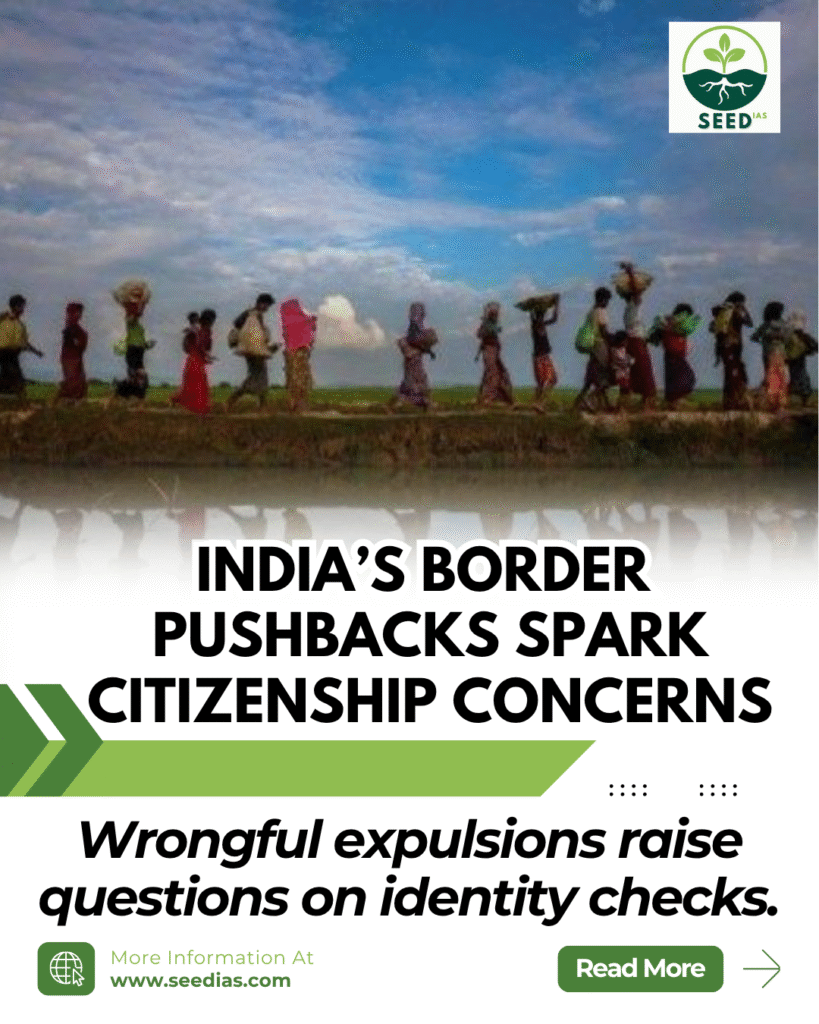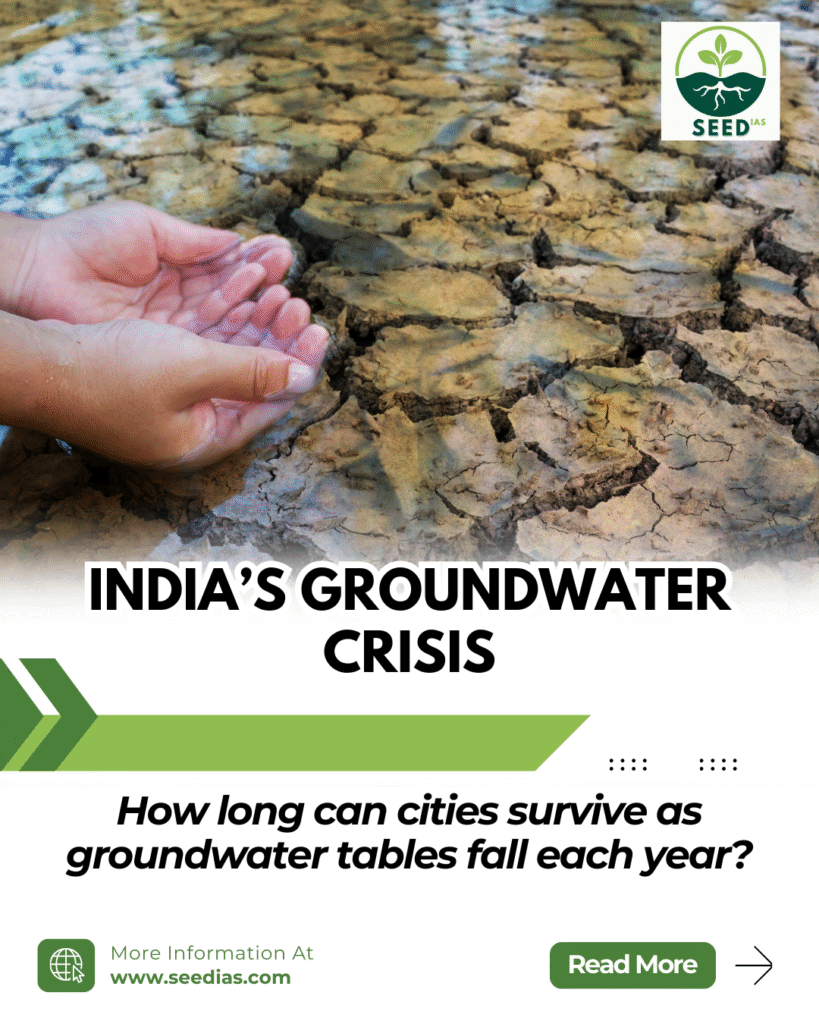Why in NEWS
India has ramped up deportation and pushback efforts along its eastern border citing national security and evolving political situations in Bangladesh. However, rising instances of wrongful expulsions—especially of Indian citizens—have triggered serious concerns around legal safeguards, identity verification, and constitutional rights.
Key Concepts and Definitions
| Term | Explanation |
|---|---|
| Deportation | Formal legal removal of a foreign national through judicial and diplomatic procedures. |
| Pushback | Informal expulsion of suspected foreigners at borders without due legal process. |
| Non-refoulement | Principle under international law prohibiting return of individuals to a place where they face danger. |
| Foreigners Tribunal (FT) | Tribunal to decide citizenship in cases of suspected illegal immigrants. |
The News in Simple Terms
- India has intensified deportations and pushbacks, especially in Assam and West Bengal, after political changes in Bangladesh and security alerts.
- Deportation follows legal steps and identity verification. Pushbacks, by contrast, happen at borders informally and without a court process.
- Reports show Indian citizens have mistakenly been expelled, highlighting the need for due process and judicial scrutiny.
Understanding Deportation vs. Pushback
| Feature | Deportation | Pushback |
|---|---|---|
| Legal Status | Legal and formal process | Informal and extra-legal action |
| Oversight | Judicial oversight, identity verification | No judicial oversight or clear accountability |
| Conducted By | MHA, FRRO, Courts, Embassies | Border Security Force (BSF) |
| Governing Law | Foreigners Act, Immigration and Foreigners Act (2025) | Not governed by specific law |
| Concerns | Ensures rights if procedures followed | High risk of rights violations and mistaken expulsions |
Key Immigration Laws and Framework
| Law/Act | Key Provisions |
|---|---|
| Immigration and Foreigners Act, 2025 | Modern law replacing outdated Acts; defines entry, deportation, visa rules. |
| Immigrants (Expulsion from Assam) Act, 1950 | Specific powers for expelling foreigners from Assam post-Partition. |
| Citizenship Act, 1955 | Governs citizenship acquisition, loss, and registration. |
| India’s Refugee Policy | No dedicated law; follows ad hoc humanitarian approach governed by Foreigners Act. |
Special Cross-Border Movement Provisions
| Country | Border Policy |
|---|---|
| Nepal | Free movement under 1950 Treaty |
| Myanmar | Free Movement Regime (FMR) within 10 km of border (now suspended) |
| Bangladesh & Pakistan | Passport and visa required; no FMR |
Major Issues with Deportation and Pushbacks
| Issue | Details |
|---|---|
| Due Process Denied | Pushbacks bypass courts, wrongly expelling even Indian citizens. |
| Impact on Marginalised | Poor, tribal, and undocumented communities face highest risk. |
| Judicial Oversight Lacking | Pushbacks lack transparency and accountability. |
| Legal Misuse | Vague interpretations of old laws used to justify removals. |
| Example | Assam’s NRC excluded nearly 2 million people, showing procedural flaws. |
Measures for a Legal and Humane Approach
| Reform Area | Suggestions |
|---|---|
| Rule of Law | Ensure identity checks, legal remedy, and Article 21 protections. |
| Institutional Reforms | Standardize Foreigners Tribunals, appoint trained members, ensure audits. |
| Humanitarian Lens | Avoid blanket expulsions; protect vulnerable groups fairly. |
| Legal Distinction | Clearly separate legal deportation from illegal pushbacks in law and policy. |
| Policy Clarity | Frame a national deportation-pushback policy respecting international norms. |
In a Nutshell
Memory Code: DIPLO – Deportation, Identity, Pushback, Law, Oversight
- D: Deportation must follow law
- I: Identity verification is key
- P: Pushbacks are extra-legal
- L: Legal reforms needed
- O: Oversight is missing
Prelims Practice Questions
- Which of the following statements about “Pushback” practices is correct?
A. It is governed by the Citizenship Act, 1955
B. It requires approval of Foreigners Tribunals
C. It is an extra-legal practice without judicial oversight
D. It is applicable only to refugees under UN treaties - The Immigration and Foreigners Act, 2025 replaces how many outdated laws?
A. 2
B. 3
C. 4
D. 5 - The principle of non-refoulement relates to:
A. Free movement of citizens across the India-Nepal border
B. Granting of citizenship to refugees
C. Prohibition of returning individuals to places of danger
D. Deportation after judicial review
Mains Practice Questions
- Examine the constitutional and human rights concerns associated with pushbacks and deportation in India. (GS-2)
- Critically evaluate India’s immigration framework in light of the Immigration and Foreigners Act, 2025.
Answer Key with Explanations
| Qn | Ans | Explanation |
|---|---|---|
| 1 | C | Pushbacks are not codified in law and occur without due process. |
| 2 | C | The 2025 Act replaced 4 outdated laws including the Foreigners Act (1946). |
| 3 | C | Non-refoulement prohibits returning people to places where they may face harm. |














